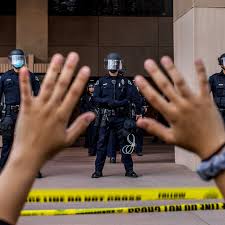The Role of Policing in Modern Society
Policing plays a crucial role in maintaining law and order within society. Law enforcement agencies are tasked with upholding the rule of law, protecting citizens, and preventing crime. The responsibilities of police officers extend beyond mere enforcement; they also serve as community leaders, mediators, and protectors of individual rights.
One of the primary functions of policing is to ensure public safety. Police officers patrol neighborhoods, respond to emergencies, and investigate criminal activities to safeguard the well-being of all members of society. Their presence acts as a deterrent to potential wrongdoers and provides reassurance to law-abiding citizens.
Moreover, policing serves as a mechanism for justice and accountability. Officers are trained to uphold the principles of fairness and equality under the law. They are responsible for apprehending suspects, gathering evidence, and ensuring that due process is followed in criminal investigations. By holding individuals accountable for their actions, police contribute to the maintenance of a just and orderly society.
Community policing has emerged as a modern approach that emphasizes collaboration between law enforcement agencies and the communities they serve. By building trust and fostering positive relationships with residents, police departments can more effectively address local concerns and prevent crime proactively. Community engagement initiatives, such as neighborhood watch programs and outreach events, help strengthen ties between officers and civilians.
Despite its importance, policing is not without challenges. Issues such as police misconduct, racial profiling, and use of excessive force have sparked debates about reforming law enforcement practices to ensure accountability and transparency. Efforts to enhance training programs, implement body cameras, and promote diversity within police forces are ongoing to address these concerns.
In conclusion, policing remains an essential component of modern society’s framework for maintaining order and promoting safety. As guardians of justice and public servants, police officers play a vital role in safeguarding communities, upholding the rule of law, and fostering trust between law enforcement agencies and the public they serve.
6 Essential Tips for Effective and Ethical Policing
- Always prioritize de-escalation techniques to defuse tense situations.
- Maintain strong communication skills to effectively interact with the community.
- Stay updated on laws and policies to ensure fair and lawful enforcement.
- Practice empathy and cultural sensitivity when engaging with diverse populations.
- Utilize body cameras and other technology for transparency and accountability.
- Seek ongoing training in areas such as crisis intervention and conflict resolution.
Always prioritize de-escalation techniques to defuse tense situations.
In the realm of policing, it is paramount to always prioritize the use of de-escalation techniques as a means to defuse tense situations. By employing strategies that aim to reduce conflict and promote calmness, law enforcement officers can effectively manage challenging encounters while prioritizing the safety and well-being of all individuals involved. De-escalation not only helps prevent escalations into violence but also fosters trust and understanding between police officers and the community they serve, ultimately contributing to a more peaceful and harmonious society.
Maintain strong communication skills to effectively interact with the community.
Effective policing requires maintaining strong communication skills to interact with the community successfully. Police officers serve as liaisons between law enforcement agencies and the public, and clear communication is essential for building trust, addressing concerns, and fostering positive relationships. By actively listening to community members, conveying information clearly, and engaging in open dialogue, officers can better understand the needs of the community and collaboratively work towards ensuring public safety and well-being. Strong communication skills not only enhance transparency and accountability but also contribute to a more cohesive and supportive relationship between law enforcement and the communities they serve.
Stay updated on laws and policies to ensure fair and lawful enforcement.
Staying updated on laws and policies is essential for police officers to ensure fair and lawful enforcement. By remaining informed about the latest legal developments, officers can effectively apply regulations in their daily duties, promoting consistency and accountability in their actions. This commitment to ongoing education not only enhances the professionalism of law enforcement but also helps protect individual rights and uphold the principles of justice within the community.
Practice empathy and cultural sensitivity when engaging with diverse populations.
It is essential for law enforcement officers to practice empathy and cultural sensitivity when engaging with diverse populations. By understanding and respecting the cultural backgrounds, beliefs, and experiences of individuals from different communities, police officers can build trust and foster positive relationships. Empathy allows officers to connect on a deeper level with community members, leading to more effective communication, conflict resolution, and ultimately, a safer and more inclusive environment for all.
Utilize body cameras and other technology for transparency and accountability.
The utilization of body cameras and other technological advancements in policing is crucial for enhancing transparency and accountability within law enforcement agencies. Body cameras provide an objective record of interactions between police officers and the public, offering valuable evidence in investigations and ensuring that actions are conducted in accordance with established protocols. By embracing technology, police departments can increase public trust, promote accountability among officers, and address concerns regarding misconduct or excessive use of force. Embracing these tools not only benefits the community by fostering transparency but also supports the professional standards upheld by law enforcement personnel.
Seek ongoing training in areas such as crisis intervention and conflict resolution.
To enhance their effectiveness in handling challenging situations, law enforcement officers should prioritize continuous training in critical areas such as crisis intervention and conflict resolution. By staying updated on the latest techniques and best practices in these domains, officers can better de-escalate tense scenarios, diffuse conflicts peacefully, and ensure the safety of both themselves and the community they serve. Ongoing education in crisis intervention and conflict resolution equips officers with the necessary skills to navigate complex interactions with empathy, professionalism, and a commitment to resolving conflicts without resorting to unnecessary force.

